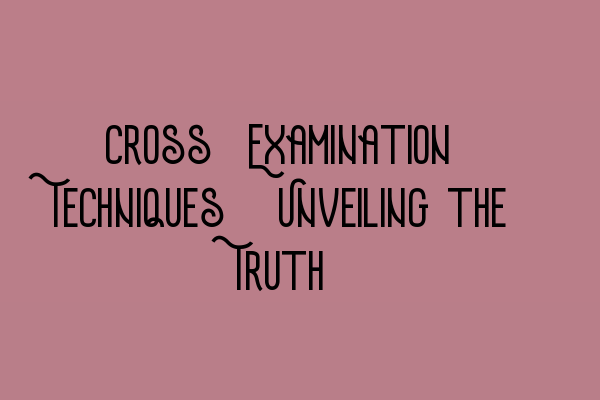Cross-Examination Techniques: Unveiling the Truth
Cross-examination is a crucial tool in the arsenal of any criminal defense solicitor. It is the art of questioning witnesses presented by the prosecution, with the goal of uncovering inconsistencies, contradictions, and ultimately, the truth. In this blog post, we will discuss some effective cross-examination techniques that can help solicitors bring out the truth in criminal cases.
Establishing Credibility:
One of the key aspects of effective cross-examination is to establish and undermine the credibility of the witness. This can be achieved through skillful questioning and challenging the witness’s version of events. By probing the witness’s motives, biases, and inconsistencies, solicitors can cast doubt on their testimony and create space for alternative interpretations.
However, it is important to remain respectful and professional throughout the cross-examination process. Discrediting a witness does not mean attacking their character or resorting to personal attacks. It is about challenging their version of events and presenting an alternative narrative based on the evidence.
Leading Questions:
Another valuable technique in cross-examination is the use of leading questions. These are questions that suggest the desired answer and are phrased in a way that makes it difficult for the witness to deviate from that answer. By asking leading questions, solicitors can control the flow of the cross-examination and elicit specific information that supports their defense strategy.
For example, if the defense solicitor wants to establish that the witness’s memory is unreliable, they might ask, “Isn’t it true that you have a history of forgetting important details?” By framing the question this way, the solicitor guides the witness towards acknowledging their memory issues, which can weaken the prosecution’s case.
Impeaching the Witness:
When encountering witnesses who may be intentionally lying or misrepresenting facts, solicitors can employ impeachment techniques to challenge their credibility. Impeachment involves presenting evidence or prior statements that contradict the witness’s current testimony.
For example, if a witness claims they saw the defendant at the crime scene, the solicitor can present evidence, such as CCTV footage or testimonies from other witnesses, that contradicts their claim. This not only undermines the witness’s credibility but also strengthens the defense’s argument.
Using Context and Logic:
In cross-examination, solicitors should use logic and context to unravel the truth. By asking thought-provoking questions and presenting logical inconsistencies, they can compel the witness to reconsider their statements and expose any weaknesses in the prosecution’s case.
For instance, if a witness claims they saw the defendant commit the crime in the dark at a considerable distance, the solicitor can ask, “How were you able to identify the defendant if it was too dark to see clearly?” This forces the witness to confront the inconsistencies in their testimony and raises doubts about their ability to accurately identify the defendant.
Conclusion:
Cross-examination is a powerful tool for solicitors to unveil the truth in criminal cases. By employing techniques such as establishing credibility, using leading questions, impeaching witnesses, and using logic and context, defense solicitors can effectively challenge the prosecution’s case and present alternative narratives.
Remember, effective cross-examination requires skill, preparation, and respect for the legal process. For more information about the SQE criminal law and practice, check out these related articles:
Keep honing your cross-examination skills and remember to always work within the confines of the law. The truth is waiting to be unveiled, and you, as a criminal defense solicitor, have the power to bring it to light.
